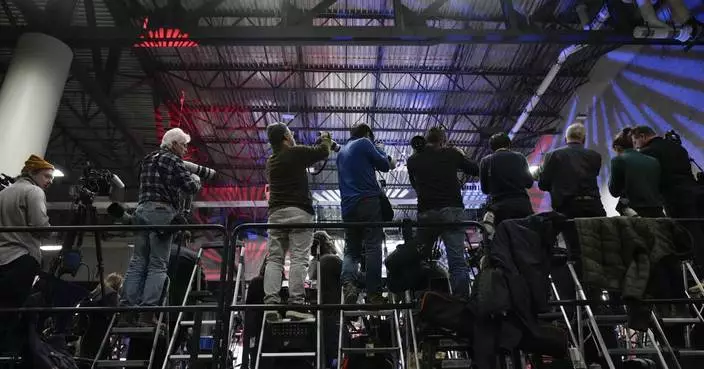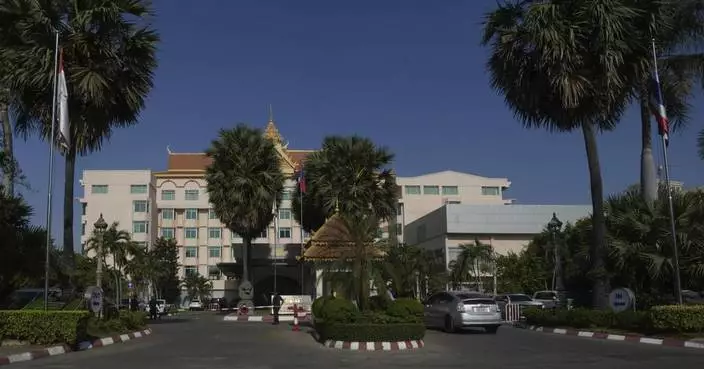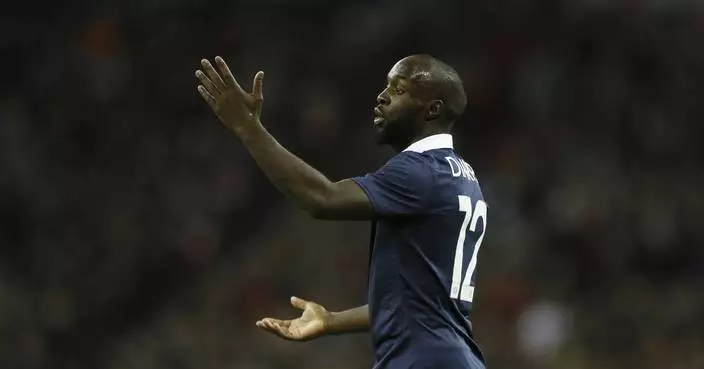French President Emmanuel Macron compared political divisions in Europe to a new type of civil war as he warned Tuesday of the need to counter growing nationalism.
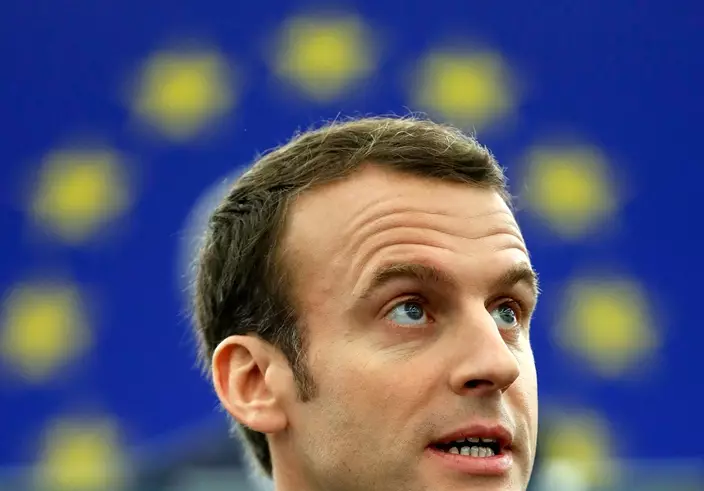
French President Emmanuel Macron delivers his speech at the European Parliament in Strasbourg, eastern France, Tuesday, April 17, 2018. (AP Photo/ Jean Francois Badias)
In a speech to European Union lawmakers, Macron urged the EU to better protect its citizens from the wars and authoritarian regimes that could divide the continent.
Click to Gallery
French President Emmanuel Macron compared political divisions in Europe to a new type of civil war as he warned Tuesday of the need to counter growing nationalism.
In a speech to European Union lawmakers, Macron urged the EU to better protect its citizens from the wars and authoritarian regimes that could divide the continent.
European Commission President Jean-Claude Juncker said Macron's rise to power in France has "given new hope" to the European Union.
"(We) are outraged each time by images we've seen of children, women who died of a chlorine attack," he said, almost shouting. "Do we sit back? Do we defend rights by saying: rights are for us, principles are for us, and realities are for other? No! No!"
All EU countries, except Britain and Hungary, have agreed to seek the opinions of their citizens on the EU's future through debates and online consultations by summer.
The French leader, who wants to help lead the EU, invoked the specter of a Europe "where some kind of civil war emerges, where our differences, our national egoisms, sometimes seem more important than what's uniting us."
Democracy has the "best chance" of fighting nationalism, he told members of the Strasbourg-based European Parliament. "Faced with authoritarianism, the answer is not democratic authoritarianism, but the authority of democracy."
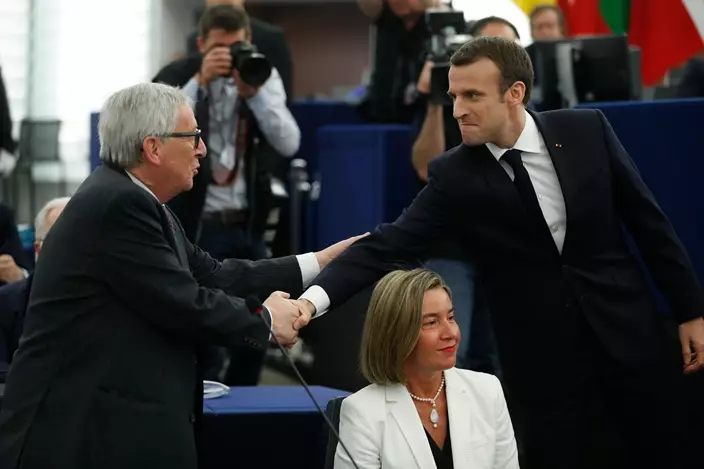
French President Emmanuel Macron, right, shakes hands with European Commission President Jean-Claude Juncker at the European Parliament in Strasbourg, eastern France, Tuesday, April 17, 2018. (AP Photo/ Jean Francois Badias)
European Commission President Jean-Claude Juncker said Macron's rise to power in France has "given new hope" to the European Union.
But Juncker stressed that the world's biggest trading bloc isn't a club led by France and Germany. "Europe is an ensemble," even with Britain set to leave the EU next year, he said.
During Macron's speech, some European lawmakers raised placards reading "Stop the war in Syria" and "Hands off Syria" to protest joint airstrikes Saturday by U.S., Britain and France on chemical weapons facilities in Syria.
Countering critics of the airstrikes, Macron showed signs of anger.
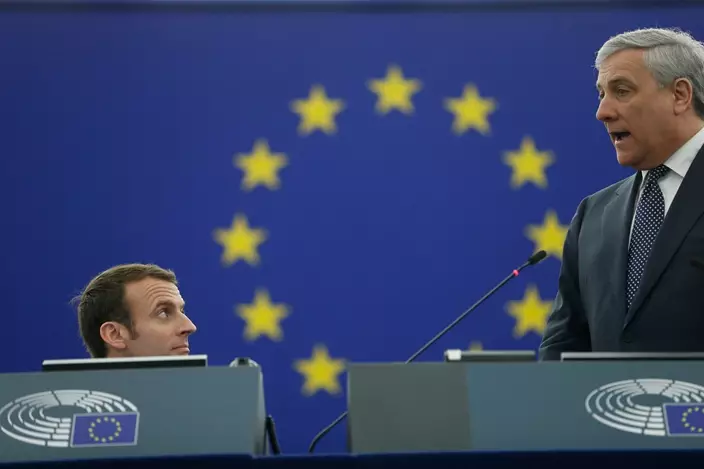
French President Emmanuel Macron, left, listens to European Parliament president Antonio Tajani at the European Parliament in Strasbourg, eastern France, Tuesday, April 17, 2018. (AP Photo/ Jean Francois Badias)
"(We) are outraged each time by images we've seen of children, women who died of a chlorine attack," he said, almost shouting. "Do we sit back? Do we defend rights by saying: rights are for us, principles are for us, and realities are for other? No! No!"
He said the U.S., France and Britain intervened in a "legitimate, multilateral framework" and stressed that the airstrikes specifically targeted three Syrian chemical weapon facilities "without any human life loss."
On the topic of the EU itself, he told the lawmakers that it's important "to have a democratic, critical debate on what Europe is about."
Macron said citizens "want a new project" for the EU that addresses their concerns and fears at a time when allies such as the U.S. are turning their backs on multilateral trade and climate change pacts.
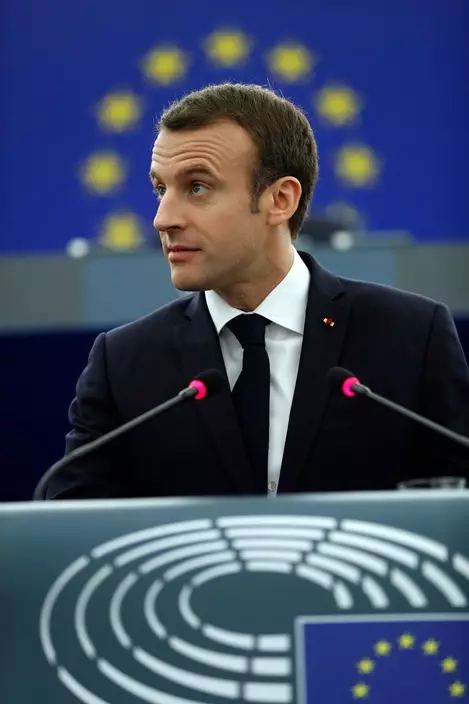
French President Emmanuel Macron delivers his speech at the European Parliament in Strasbourg, eastern France, Tuesday, April 17, 2018. (AP Photo/ Jean Francois Badias)
All EU countries, except Britain and Hungary, have agreed to seek the opinions of their citizens on the EU's future through debates and online consultations by summer.
Macron called for an energetic campaign for the European Parliament election in May 2019, two months after Britain's scheduled departure from the EU.
However, he ruled out enlarging the EU until the existing members are more deeply integrated and the bloc has undergone reforms. He said now wasn't the time to allow Western Balkans countries to join.
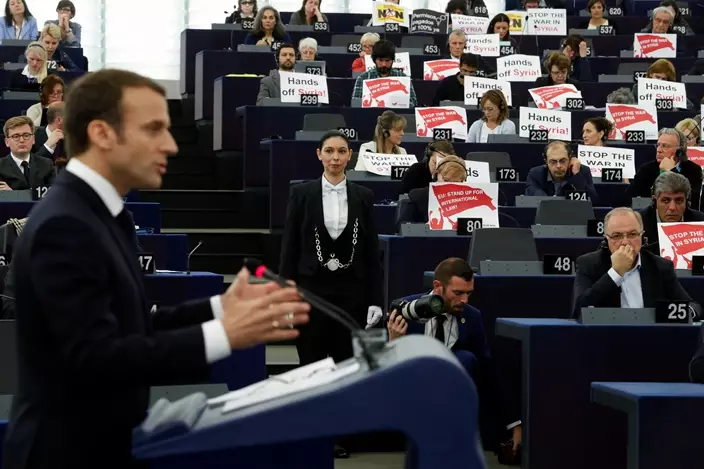
European lawmakers raise placards reading "Stop the War in Syria" in protest against airstrikes launched by the U.S., Britain and France in Syria last week criticizing the legitimacy of the operation, as French President Emmanuel Macron delivers his speech at the European Parliament in Strasbourg, eastern France, Tuesday, April 17, 2018. (AP Photo/ Jean Francois Badias)
Macron will meet with German Chancellor Angela Merkel in Berlin on Thursday, as France and Germany aim to agree on proposals for EU reforms by June. Macron will attend a debate on Europe in the eastern French town of Epinal later Tuesday.
BEIRUT (AP) — The European Union announced Thursday an aid package for Lebanon of 1 billion euros — about $1.06 billion — much of which will go to boost border control to halt the flow of asylum seekers and migrants from the small, crisis-wracked country across the Mediterranean Sea to Cyprus and Italy.
The deal follows other EU aid packages for countries such as Egypt, Tunisia and Mauritania to fortify their borders. It comes against a backdrop of increasing hostility toward Syrian refugees in Lebanon and a major surge in irregular migration of Syrian refugees from Lebanon to Cyprus.
European Union Commission President Ursula von der Leyen said during a Beirut visit with Cypriot President Nikos Christodoulides that the aid distribution will start this year and last till 2027.
The bulk of the aid — 736 million euros — would go to support Syrian refugees “and other vulnerable groups” in Lebanon, while 200 million euros are meant to bolster Lebanese security services in enforcing border and migration control, according to figures provided by the Cypriot government.
An unspecified amount would go to Lebanese fishermen, to discourage them from selling their boats to smugglers.
Von der Leyen said the EU will also work on a “more structured approach to voluntary return" of Syrian refugees "in close cooperation with” the U.N. refugee agency. The bloc will continue to maintain “legal pathways” for resettlement of refugees in Europe, she said.
Lebanon's caretaker Prime Minister Najib Mikati praised the package, saying that “Lebanon’s security is security for European countries and vice versa,” and that an escalation of the crisis ”will not be limited to Lebanon but will extend to Europe."
Lebanon, which has been in the throes of a severe financial crisis since 2019, hosts nearly 780,000 registered Syrian refugees and hundreds of thousands more who are unregistered, the world's highest refugee population per capita.
Lebanese political officials have for years urged the international community to resettle the refugees in other countries or assist their return to Syria — voluntarily or not. Lebanese security forces have stepped up deportations of Syrians over the past year.
Tensions further flared after an official with the Christian nationalist Lebanese Forces party, Pascal Suleiman, was killed last month in what military officials said was a botched carjacking by a Syrian gang. The incident prompted outbreaks of anti-Syrian violence by vigilante groups.
Meanwhile, Cypriot authorities complain the island nation has been overwhelmed by irregular migration of Syrian asylum seekers, many of them coming on boats from Lebanon.
The UNHCR in Lebanon said it had verified 59 “actual or attempted” departures by boats carrying a total of 3,191 passengers from Lebanon between January and mid-April, compared to three documented boat movements carrying 54 passengers in the same period last year. Usually, few boats attempt the much more dangerous crossing in the winter. In all of 2023, UNHCR recorded 65 boat departures carrying 3,927 passengers.
Cyprus has taken a new approach to halting the flow of migrants. Last month, it suspended processing of Syrian asylum applications, and human rights groups accused the Cypriot coast guard of forcibly turning back five boats carrying about 500 asylum seekers coming from Lebanon. Cypriot officials have denied this.
Bassel al-Shayoukh, a Syrian refugee from Idlib living in Lebanon since 2014, said his brother and several cousins and nephews were on one of the boats turned back. Now he wants to make the journey himself.
“In the beginning I thought that in a year or two the war would be over in Syria,” he said, but it dragged on, while in Lebanon “every year ... the situation began to get worse.”
Shayoukh said he fears being beaten by vigilantes or deported to Syria after Lebanese authorities declined to renew his residency permit.
His 17-year-old nephew, who declined to give his name fearing for his safety, said the Cypriot coast guard started making waves to push the boat he was on away. “I was terrified... I don’t know how to swim,” he said. “I thought we were going to die.”
The people on the boats “stayed three days without food or water” before turning back to Lebanon, the teen added.
Back in Lebanon, they were detained by the army; those registered with UNHCR were released and the others deported.
Mohammed Sablouh, a Lebanese human rights lawyer who works on refugee and migrant cases, says Lebanese authorities are deliberately “turning a blind eye" to the surge in migration to "pressure the international community.”
The Lebanese army did not respond to a request for comment on their measures to combat smuggling.
Thursday's aid announcement comes ahead of the annual fundraising conference for the Syrian crisis in Brussels later this month. After 13 years of civil war, donor fatigue has set in while the world’s attention is occupied by the humanitarian fallout of more recent conflicts in Ukraine and Gaza.
The Cypriot president said Thursday was a “historic day” and called for European officials to go farther and declare some areas of Syria safe for return.
“The current situation is not sustainable for Lebanon. It is not sustainable for Cyprus, it is not sustainable for the European Union,” Christodoulides said.
But not all Lebanese officials are convinced the European aid would solve the problem.
Lebanese Forces party head Samir Geagea told The Associated Press earlier this week that European authorities are mainly concerned “that the refugees don’t go to Europe."
"For us the problem is that we cannot have our country drowning in illegal Syrian refugees,” Geagea said, urging for Syrians to be sent back to either government or opposition-held areas of the neighboring country.
But Shayoukh says he has nowhere to go.
The Damascus government wants him for opposing Syrian President Bashar Assad, he said, while the Islamist group that now controls his hometown behaves "the same way as the regime’s intelligence services” in crushing dissidents.
Associated Press writer Menelaos Hadjicostis in Nicosia, Cyprus, contributed to this report.
Follow AP’s global migration coverage at: https://apnews.com/hub/migration

Lebanese caretaker Prime Minister Najib Mikati, center, speaks during his meeting with Cyprus' President Nikos Christodoulides, left, and President of the European Commission Ursula von der Leyen at the government palace in Beirut, Lebanon, Thursday, May 2, 2024. (AP Photo/Hassan Ammar)
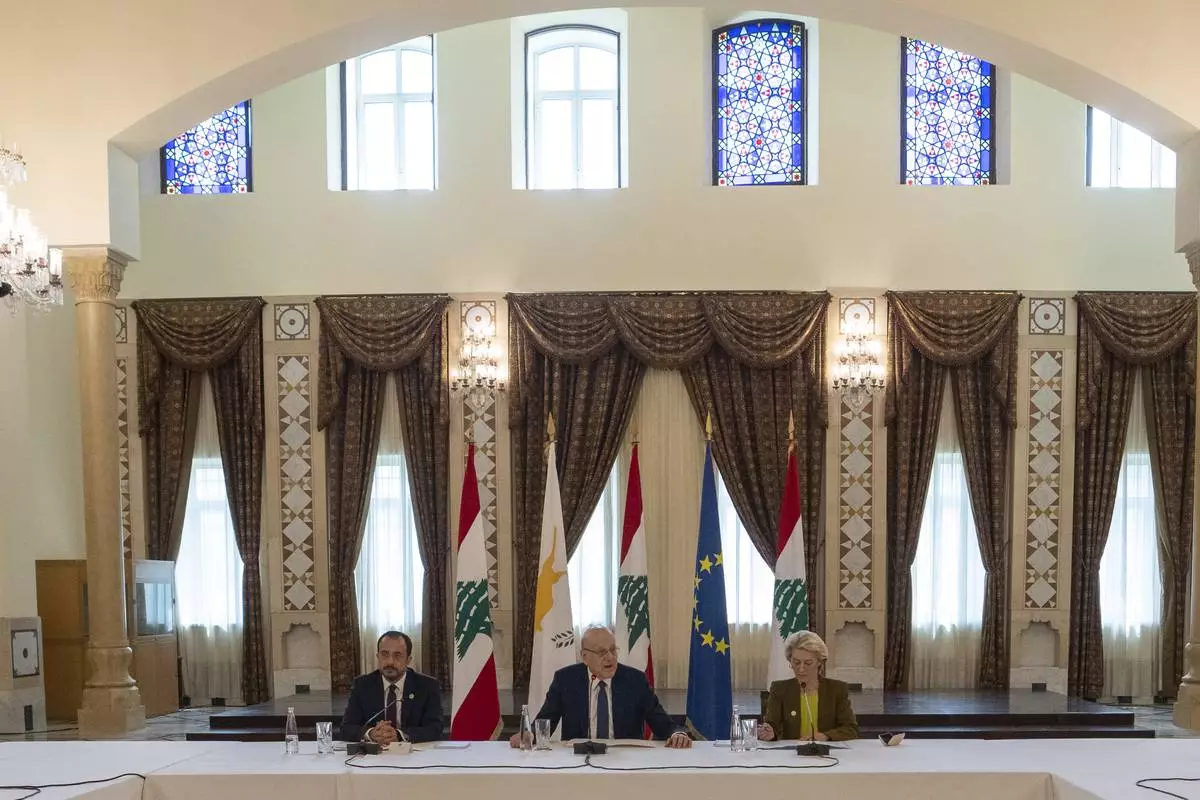
Lebanese caretaker Prime Minister Najib Mikati, center, speaks during his meeting with Cyprus' President Nikos Christodoulides, left, and President of the European Commission Ursula von der Leyen at the government palace in Beirut, Lebanon, Thursday, May 2, 2024. (AP Photo/Hassan Ammar)
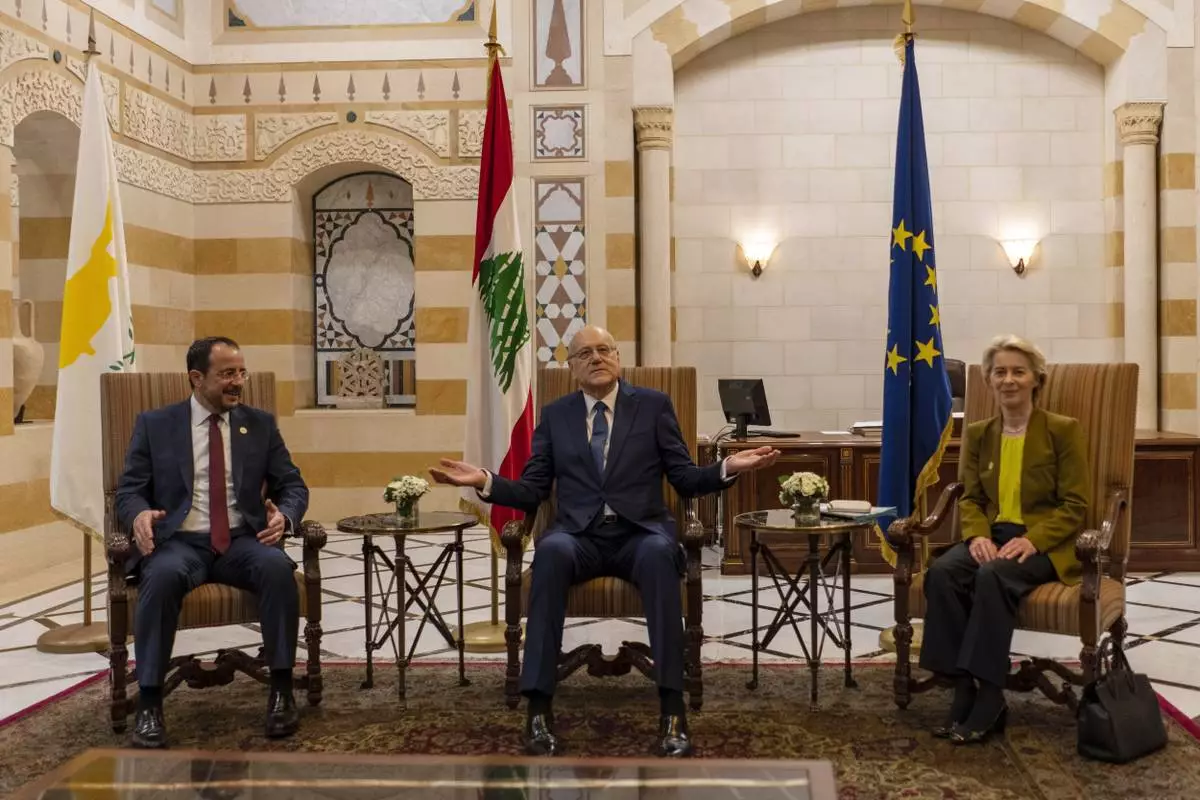
Lebanese caretaker Prime Minister Najib Mikati, center, welcomes Cyprus' president Nikos Christodoulides, left, and President of the European Commission Ursula von der Leyen before their meeting at the government palace in Beirut, Lebanon, Thursday, May 2, 2024. (AP Photo/Hassan Ammar)
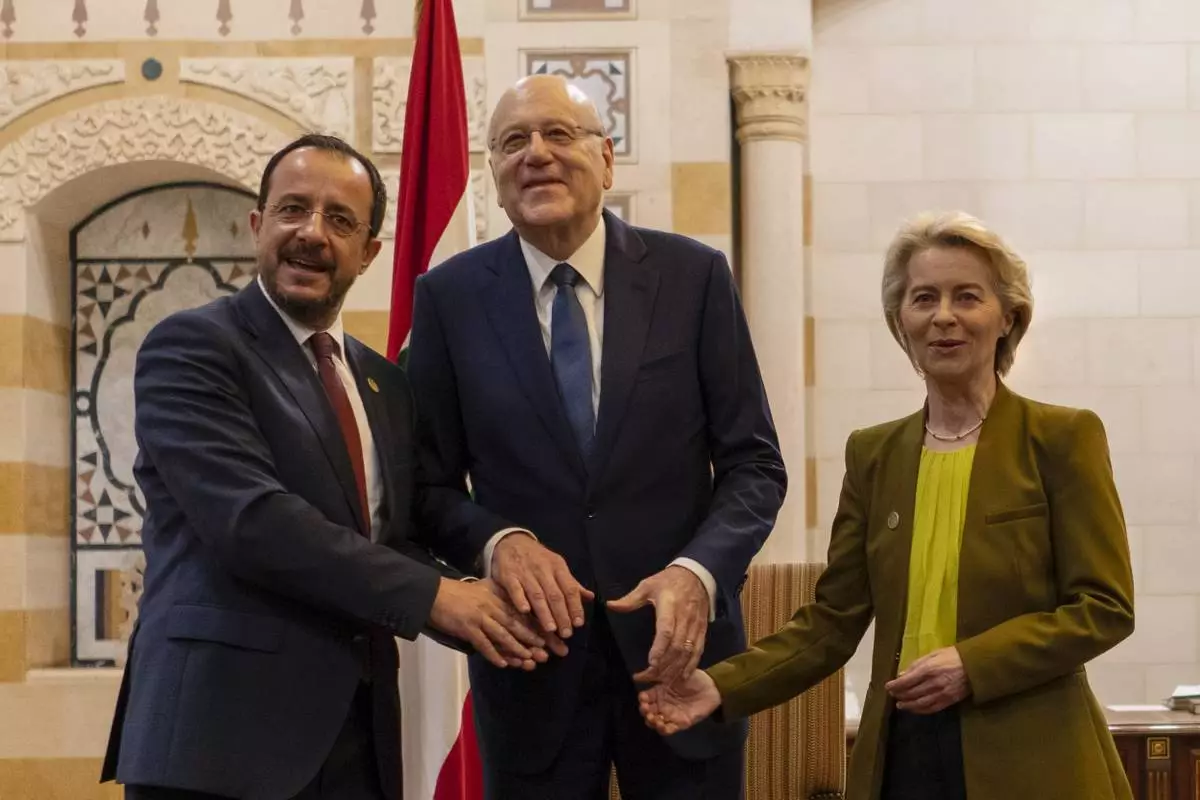
Lebanese caretaker Prime Minister Najib Mikati, center, Cyprus' President Nikos Christodoulides, left, and President of the European Commission Ursula von der Leyen pose for photograph at the government palace in Beirut, Lebanon, Thursday, May 2, 2024. (AP Photo/Hassan Ammar)
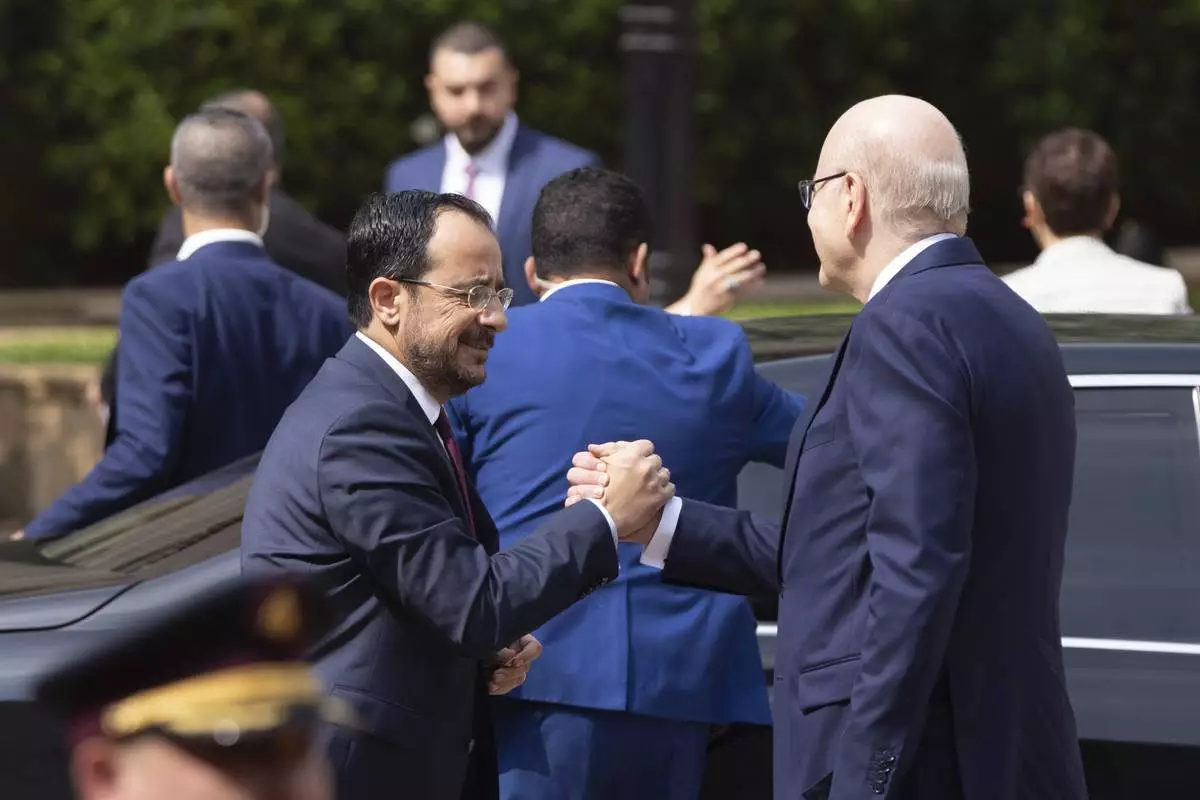
Lebanese caretaker Prime Minister Najib Mikati, right, welcomes Cyprus' president Nikos Christodoulides before their meeting at the government palace in Beirut, Lebanon, Thursday, May 2, 2024. (AP Photo/Hassan Ammar)

Cyprus' President Nikos Christodoulides, left, and President of the European Commission Ursula von der Leyen, center, review an honor guard upon their arrival to meet with the Lebanese Speaker Nabih Berri, in Beirut, Thursday, May 2, 2024. (AP Photo/Hussein Malla)

Lebanese caretaker Prime Minister Najib Mikati, center, speaks during his meeting with Cyprus' President Nikos Christodoulides, left, and President of the European Commission Ursula von der Leyen at the government palace in Beirut, Lebanon, Thursday, May 2, 2024. (AP Photo/Hassan Ammar)
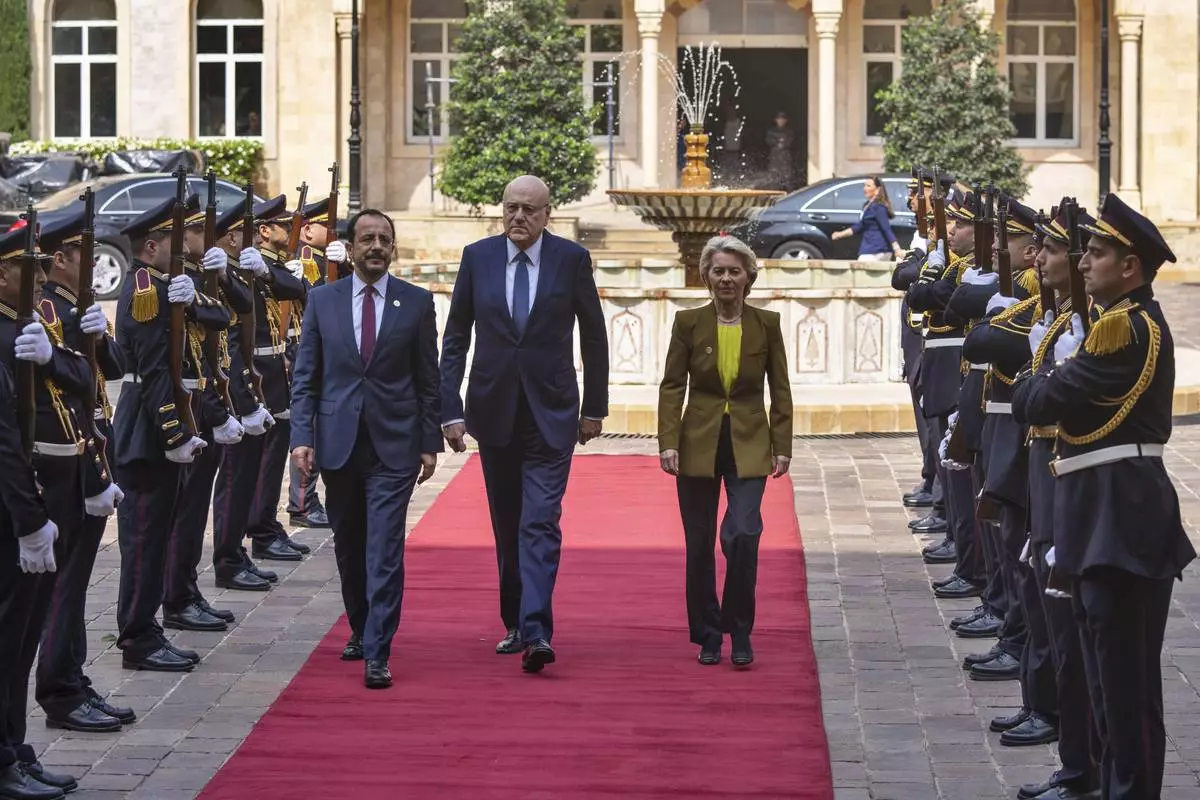
Lebanese caretaker Prime Minister Najib Mikati, center, welcomes Cyprus' President Nikos Christodoulides, left, and President of the European Commission Ursula von der Leyen at the government palace in Beirut, Lebanon, Thursday, May 2, 2024. (AP Photo/Hassan Ammar)
















